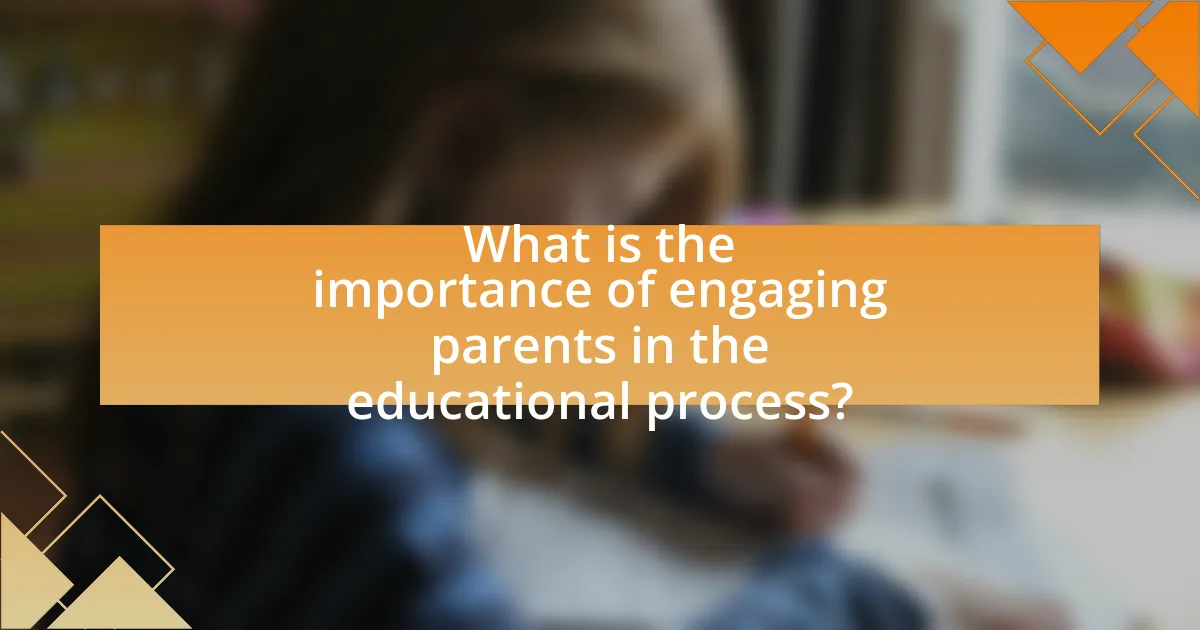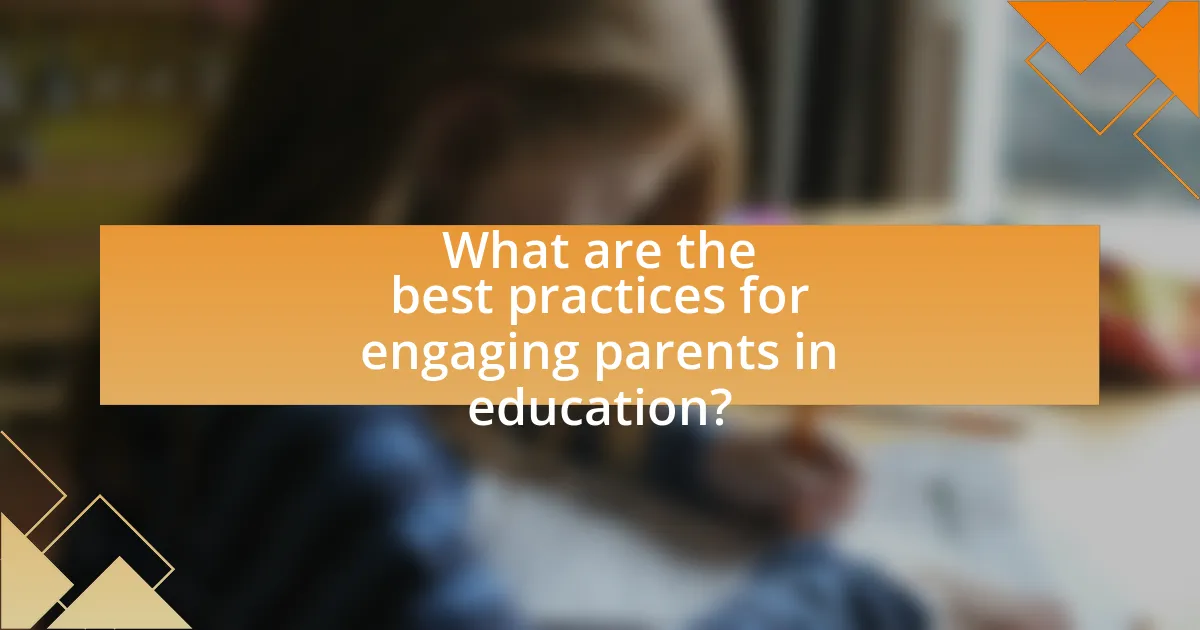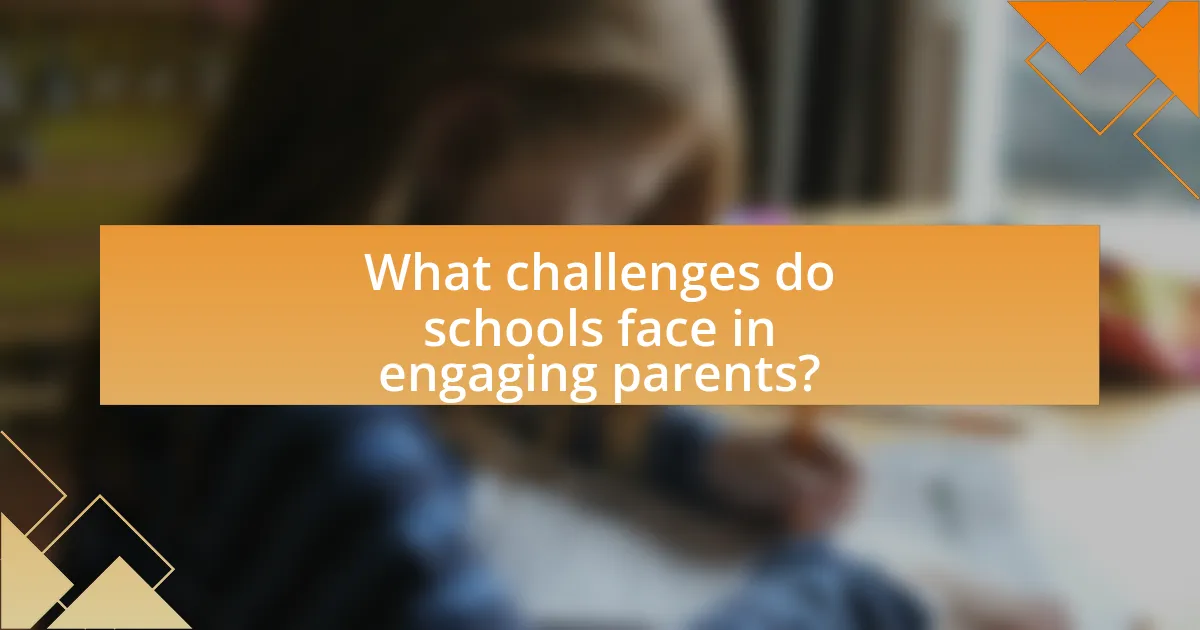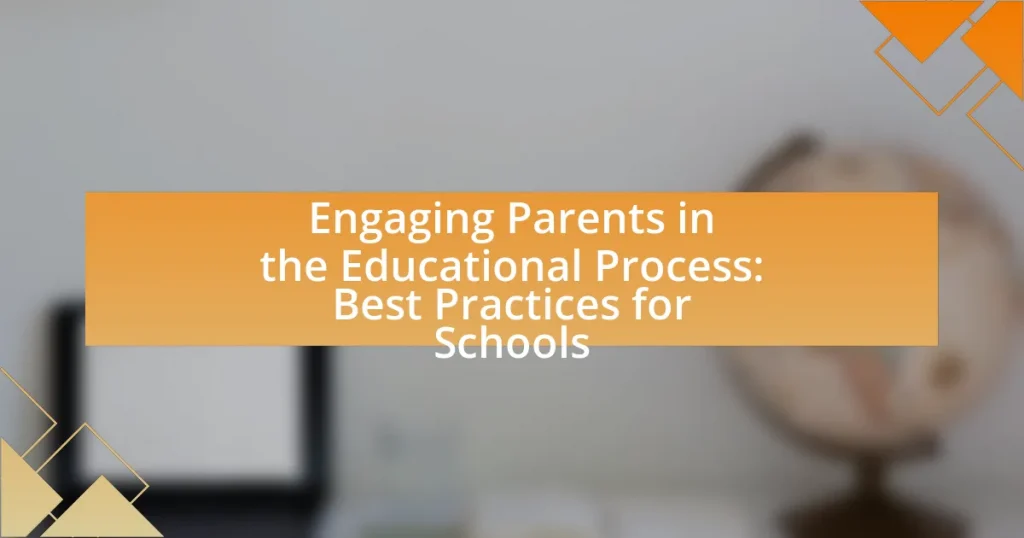Engaging parents in the educational process is essential for enhancing student achievement and well-being. Research shows that active parental involvement leads to higher grades, better attendance, and increased motivation among students. This article outlines the importance of parental engagement, its impact on academic performance, and the benefits for schools, including improved student outcomes and stronger school-community relationships. It also discusses best practices for schools to effectively communicate with parents, overcome barriers to involvement, and utilize technology to foster engagement. By prioritizing parent engagement, schools can create a supportive learning environment that benefits both students and the broader educational community.

What is the importance of engaging parents in the educational process?
Engaging parents in the educational process is crucial because it significantly enhances student achievement and well-being. Research indicates that students whose parents are actively involved in their education tend to have higher grades, better attendance, and increased motivation. For instance, a study by the National Education Association found that parental involvement can lead to a 30% increase in student performance. Additionally, when parents collaborate with teachers, it fosters a supportive learning environment, which is essential for student success. This partnership also helps parents understand the educational system better, enabling them to advocate effectively for their children.
How does parental engagement impact student success?
Parental engagement significantly enhances student success by fostering a supportive learning environment and improving academic performance. Research indicates that students with involved parents are more likely to achieve higher grades, attend school regularly, and have better social skills. A study published in the “Review of Educational Research” found that parental involvement positively correlates with student achievement across various age groups and demographics, demonstrating that active participation in a child’s education leads to improved outcomes.
What specific outcomes are associated with high levels of parental involvement?
High levels of parental involvement are associated with improved academic performance, enhanced social skills, and increased student motivation. Research indicates that students with engaged parents tend to achieve higher grades and test scores, as evidenced by a study published in the “Review of Educational Research” which found that parental involvement positively correlates with student achievement across various educational settings. Additionally, these students often exhibit better behavior and social skills, as parental engagement fosters a supportive home environment that encourages positive interactions and emotional development.
How does parental engagement influence academic performance?
Parental engagement significantly enhances academic performance by fostering a supportive learning environment and promoting positive attitudes toward education. Research indicates that students with involved parents tend to achieve higher grades, have better attendance, and exhibit improved behavior in school. For instance, a study published in the “Review of Educational Research” found that parental involvement is associated with a 10-20% increase in student achievement across various subjects. This correlation is attributed to parents reinforcing educational values at home, assisting with homework, and maintaining communication with teachers, which collectively contribute to a child’s academic success.
Why should schools prioritize parent engagement?
Schools should prioritize parent engagement because it significantly enhances student achievement and well-being. Research indicates that students whose parents are actively involved in their education tend to have higher grades, better attendance, and increased motivation. For instance, a study by the Harvard Family Research Project found that effective parent engagement can lead to a 30% increase in student performance. Furthermore, engaged parents contribute to a positive school climate, fostering collaboration between families and educators, which ultimately supports the overall educational process.
What benefits do schools gain from actively involving parents?
Schools gain improved student performance and engagement from actively involving parents. Research indicates that when parents participate in their children’s education, students demonstrate higher academic achievement, better attendance, and increased motivation. A study by the Harvard Family Research Project found that students whose parents are engaged in their education are more likely to earn higher grades and test scores, and they also exhibit better social skills. Additionally, parental involvement fosters a stronger school community, enhances communication between parents and educators, and leads to increased support for school initiatives, ultimately benefiting the overall educational environment.
How can parent engagement improve school-community relationships?
Parent engagement can significantly improve school-community relationships by fostering collaboration and trust between families and educational institutions. When parents actively participate in school activities, they contribute to a shared sense of purpose and accountability, which enhances communication and understanding. Research indicates that schools with high levels of parent involvement report better student outcomes, increased community support, and stronger partnerships with local organizations. For instance, a study by the Harvard Family Research Project found that effective parent engagement strategies lead to improved student achievement and greater community involvement, demonstrating the positive impact of collaborative efforts on educational success.

What are the best practices for engaging parents in education?
The best practices for engaging parents in education include regular communication, involvement in school activities, and providing resources for at-home learning. Regular communication, such as newsletters and parent-teacher conferences, fosters a strong relationship between parents and educators, ensuring parents are informed about their child’s progress and school events. Involvement in school activities, like volunteering or attending events, creates a sense of community and encourages parents to take an active role in their child’s education. Providing resources, such as workshops or online materials, equips parents with tools to support their child’s learning at home. Research shows that schools with strong parent engagement see improved student outcomes, including higher academic achievement and better attendance rates.
How can schools effectively communicate with parents?
Schools can effectively communicate with parents by utilizing multiple channels such as emails, newsletters, parent-teacher conferences, and digital platforms like school websites and social media. These methods ensure that information is accessible and timely, fostering a collaborative environment. Research indicates that regular communication increases parental involvement, which is linked to improved student outcomes. For instance, a study by the Harvard Family Research Project found that effective school-family partnerships can lead to higher student achievement and better behavior.
What communication tools are most effective for schools?
The most effective communication tools for schools include email, messaging apps, and school management systems. Email serves as a formal channel for sharing important updates and announcements, while messaging apps like Remind and ClassDojo facilitate real-time communication between teachers and parents. School management systems such as PowerSchool and Schoology provide centralized platforms for sharing grades, attendance, and other essential information, enhancing transparency and engagement. Research indicates that schools utilizing these tools see improved parent involvement and satisfaction, as they streamline communication and foster a collaborative educational environment.
How can schools ensure clear and consistent messaging to parents?
Schools can ensure clear and consistent messaging to parents by implementing a structured communication plan that utilizes multiple channels. This plan should include regular updates through newsletters, emails, and school websites, ensuring that all information is uniform across platforms. Research indicates that schools that adopt a multi-channel approach see a 30% increase in parent engagement, as parents are more likely to receive and understand important information when it is presented consistently. Additionally, schools should establish a feedback mechanism, allowing parents to voice concerns or seek clarification, which further enhances clarity and consistency in messaging.
What strategies can schools implement to involve parents in school activities?
Schools can implement strategies such as organizing regular parent-teacher meetings, creating volunteer opportunities, and utilizing digital communication platforms to involve parents in school activities. Regular parent-teacher meetings foster open communication and collaboration, allowing parents to engage directly with educators about their child’s progress. Creating volunteer opportunities, such as classroom assistance or event planning, encourages parents to participate actively in the school community. Additionally, utilizing digital communication platforms, like school websites or social media, keeps parents informed and connected, facilitating their involvement in school events and initiatives. Research indicates that schools with strong parent engagement see improved student outcomes, highlighting the effectiveness of these strategies.
How can schools create volunteer opportunities for parents?
Schools can create volunteer opportunities for parents by establishing clear communication channels and identifying specific needs within the school community. By sending out surveys or hosting meetings, schools can gather input on areas where parental involvement is desired, such as tutoring, event planning, or classroom assistance. Research indicates that schools with active parent volunteer programs see improved student outcomes, as parental engagement is linked to higher academic performance and better school attendance. For example, a study published in the “Journal of Educational Psychology” found that schools with robust volunteer programs reported a 20% increase in student achievement scores.
What role do parent-teacher conferences play in engagement?
Parent-teacher conferences play a crucial role in enhancing engagement between parents and educators. These conferences provide a structured opportunity for parents to discuss their child’s academic progress, behavioral development, and social interactions with teachers, fostering a collaborative relationship. Research indicates that when parents are actively involved in their child’s education, students demonstrate improved academic performance and increased motivation. For instance, a study published in the “Journal of Educational Psychology” found that parental involvement, facilitated through regular communication such as conferences, significantly correlates with higher student achievement levels. This underscores the importance of parent-teacher conferences as a vital mechanism for promoting parental engagement in the educational process.

What challenges do schools face in engaging parents?
Schools face several challenges in engaging parents, including communication barriers, differing expectations, and time constraints. Communication barriers arise from language differences and varying levels of literacy among parents, which can hinder effective dialogue between schools and families. Differing expectations occur when parents and educators have contrasting views on educational priorities and involvement, leading to misunderstandings. Time constraints are significant, as many parents juggle work and family responsibilities, making it difficult for them to participate in school activities or meetings. These challenges can limit parental involvement, which research shows is crucial for student success, as highlighted in studies by the National Education Association.
How can schools overcome barriers to parental involvement?
Schools can overcome barriers to parental involvement by implementing flexible communication strategies and providing accessible resources. For instance, schools can utilize multiple communication channels, such as emails, text messages, and social media, to reach parents effectively. Research indicates that schools employing diverse communication methods see a 30% increase in parental engagement (Henderson & Mapp, 2002). Additionally, offering workshops and resources at various times, including evenings and weekends, accommodates parents’ schedules, thereby enhancing participation. By addressing logistical challenges and fostering open lines of communication, schools can significantly improve parental involvement in the educational process.
What common obstacles do parents face in participating in their child’s education?
Parents commonly face time constraints, lack of resources, and communication barriers when participating in their child’s education. Time constraints arise from balancing work and family responsibilities, making it difficult for parents to attend school events or meetings. Lack of resources, such as transportation or financial limitations, can hinder their ability to engage fully. Communication barriers, including language differences or insufficient information from schools, can prevent parents from understanding how to support their child’s learning effectively. These obstacles are supported by research indicating that parental involvement is often limited by these factors, impacting student outcomes and engagement levels.
How can schools address cultural and socioeconomic barriers to engagement?
Schools can address cultural and socioeconomic barriers to engagement by implementing inclusive communication strategies and providing resources tailored to diverse family needs. For instance, schools can offer multilingual materials and translation services to ensure non-English speaking families understand school communications, which is crucial as approximately 21% of U.S. public school students come from homes where a language other than English is spoken. Additionally, schools can establish partnerships with community organizations to provide support services, such as food assistance and transportation, which can alleviate some socioeconomic challenges that hinder parental involvement. Research indicates that schools that actively engage with families through culturally relevant programs see improved student outcomes, highlighting the importance of addressing these barriers effectively.
What role does technology play in enhancing parent engagement?
Technology plays a crucial role in enhancing parent engagement by facilitating communication and providing access to educational resources. Digital platforms, such as school websites, mobile apps, and social media, enable real-time updates on student progress and school events, fostering a stronger connection between parents and educators. Research indicates that schools utilizing technology for parent communication see a 20% increase in parental involvement, as reported by the National Center for Education Statistics. This engagement is further supported by tools that allow parents to participate in virtual meetings and access learning materials, making it easier for them to support their children’s education from home.
How can schools utilize digital platforms to connect with parents?
Schools can utilize digital platforms to connect with parents by implementing communication tools such as email newsletters, school websites, and mobile apps. These platforms facilitate timely updates on student progress, school events, and important announcements, ensuring parents remain informed and engaged. For instance, a study by the National Center for Education Statistics found that schools using digital communication methods reported higher levels of parental involvement, which positively impacts student achievement. By leveraging these digital tools, schools can foster a collaborative environment that enhances the educational experience for students and strengthens the school-parent relationship.
What are the best practices for using social media to engage parents?
The best practices for using social media to engage parents include creating informative and relevant content, fostering two-way communication, and utilizing targeted platforms. Schools should share updates on events, academic achievements, and resources that support student learning, as this keeps parents informed and involved. Encouraging parents to interact through comments, messages, and polls enhances engagement and builds a community. Additionally, selecting platforms that parents frequently use, such as Facebook or Instagram, ensures that the communication reaches the intended audience effectively. Research indicates that schools that actively engage parents through social media see improved student outcomes and increased parental involvement, highlighting the effectiveness of these practices.
What practical tips can schools implement to enhance parent engagement?
Schools can enhance parent engagement by implementing regular communication strategies, such as newsletters, emails, and parent-teacher conferences. These methods keep parents informed about school activities, academic progress, and opportunities for involvement. Research indicates that schools with consistent communication see a 20% increase in parent participation in school events (Henderson & Mapp, 2002). Additionally, schools can create volunteer opportunities that align with parents’ skills and interests, fostering a sense of community and shared responsibility. Providing workshops on topics like child development and academic support can also empower parents, leading to more active engagement in their children’s education.



